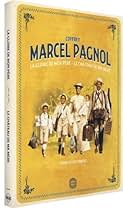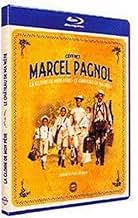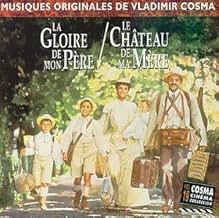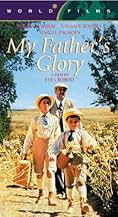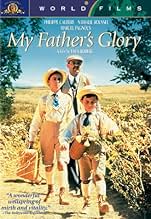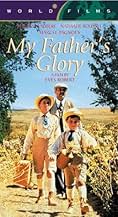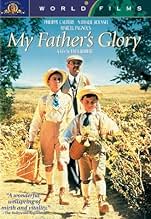IMDb RATING
7.6/10
7.5K
YOUR RATING
At the end of the nineteenth century, little Marcel lives with his parents in the Provence countryside. During his holiday, Marcel meets Lili, a local boy who knows all the secrets of the hi... Read allAt the end of the nineteenth century, little Marcel lives with his parents in the Provence countryside. During his holiday, Marcel meets Lili, a local boy who knows all the secrets of the hills, and the two become fast friends.At the end of the nineteenth century, little Marcel lives with his parents in the Provence countryside. During his holiday, Marcel meets Lili, a local boy who knows all the secrets of the hills, and the two become fast friends.
- Awards
- 2 wins & 5 nominations total
7.67.4K
1
2
3
4
5
6
7
8
9
10
Featured reviews
Poetry in motion
This film takes us back to 1900 and depicts a family with children who are refreshingly innocent, yet believable and amusing every step of the way. The story takes us on a journey with Marcel, the narrator, who thinks his father is superhuman and refuses to see him as anything less. To view life through Marcel's eyes is enchanting; he is so easily spellbound by his surroundings, so in love with the hills of his native Provence.
The cinematography is absolutely breath-taking, giving one the feeling of watching poetry in motion. The scene at the park on a Sunday afternoon is like watching a painting come to life. But cinematography is only a feather on the cap of this first rate production. The direction is superb, and the performances very touching.
I recommend this film highly. It is good as a visual sedative, and the only side effect it might have is a possible urge to quit your job, pack it up, and move to the French countryside writer Marcel Pagnol so loved.
The cinematography is absolutely breath-taking, giving one the feeling of watching poetry in motion. The scene at the park on a Sunday afternoon is like watching a painting come to life. But cinematography is only a feather on the cap of this first rate production. The direction is superb, and the performances very touching.
I recommend this film highly. It is good as a visual sedative, and the only side effect it might have is a possible urge to quit your job, pack it up, and move to the French countryside writer Marcel Pagnol so loved.
childhood memories where everything was as fresh as the bright blue sky
Marcel Pagnol always wanted to adapt for the screen his childhood memories that he related in 4 novels. Unfortunately, he died without he made his plan. So, it was one of his friends, Yves Robert who undertook to make the coveted movie and the result turns out to be very convincing. Yves Robert's movie restitutes perfectly the atmosphere of Pagnol's book and he made a tender, hearty movie, lulled by Vladimir Cosma's nonchalant music where the shiny sun and sky of Provence reply to the wild beauty of the hills. These hills will make the little Marcel's enchantment. Thanks to a fluid making, Robert films the happiness and the naïvety of childhood with a certain impishness. Besides, Robert always enjoyed filming childhood like Truffaut and we particularly rediscover the quoted impishness in one of his movies: "la guerre des boutons". Robert introduces us the Pagnol's family and shows liking towards his characters. More than Marcel's character, these are his feelings towards his family which Robert tries to define, especially the pride towards his lucid and ambitious father (excellent Philippe Caubère) after his hunting achievement. Moreover, he loves tenderly his mother but tends to despise his uncle. He blames him for being a liar and a conceited person. At the end, a limpid movie that remembers with nostalgia of a past era. Pagnol would certainly have appreciated the result. If the movie introduces a bitter end, it depicts the last picture as something symbolic: " the glory of Marcel's father".
Don't Forget The Companion Piece
This, like "Jean de Florette" and "Manon Of The Spring" is the first of two French films that go together. The second part of this story is the film, "My Mother's Castle." See them both, but if you can only see one, my recommendation is "My Mother's Castle."
As in many French films, this offers very little action and not much that is noteworthy but is filled with interesting characters and excellent storytelling. The French still offer that great storytelling, something that has slowly faded among filmmakers in other countries.
This story is based on the memoirs of Marcel Pagnol, a very Liberal educator and atheist. His views are probably the main reason critics all loved this movie. They could identify.
Despite the father's shortcomings, there is a nice appeal here as all the characters are interesting to varying degrees. I love the way they all express themselves, certainly different than we do here in North America. As with most of these French stories, there is very little profanity, too.
As in many French films, this offers very little action and not much that is noteworthy but is filled with interesting characters and excellent storytelling. The French still offer that great storytelling, something that has slowly faded among filmmakers in other countries.
This story is based on the memoirs of Marcel Pagnol, a very Liberal educator and atheist. His views are probably the main reason critics all loved this movie. They could identify.
Despite the father's shortcomings, there is a nice appeal here as all the characters are interesting to varying degrees. I love the way they all express themselves, certainly different than we do here in North America. As with most of these French stories, there is very little profanity, too.
Enchanting childhood nostalgia
This is a movie for those who enjoy magic and nostalgia while floating away in childhood memories. It is the calm and enchanting story of the adventures of Marcel Pagnol. Julien Ciamaca does an outstanding job, he is handsome, naive and buoyant. The landscape and the narrative style make this movie, at least in my eyes, a real masterpiece. The entire story is full of nostalgia and deals with Marcel's very own perception of life. His friendship with Lili is honestly depicted and wonderfully staged. The boys do a great job, indeed. It is a tale that takes you back to contemporary France and revives the summer in the Provence region, a summer full of innocent joy and adventures. Inspiring and well-acted, the setting is beautiful and the music just perfect. All characters are well cast.
10eustfam
A must-see! One of the best I've ever watched!
The story is simple--it is about a young boy who spent his summers in the hills of Provence--yet it manages to tug the viewer at the heart. It is such a far cry from the families we see today who have no time to relate to each other. The boy's love for his father (and mother)clearly shines in this film.
The father is a school teacher, an atheist, and a republican. But he is a loving husband and a great father to his children. The mother is shy and affectionate and is sensitive the needs of her husband and children. So what makes this film such an enchanting experience? Since I am not a writer, I cannot really put into words the way I felt after watching this film. I know it left a smile in my heart...it also made me nostalgic for it reminded me of my own childhood. I wanted it to go on long after the movie ended. Watch it and you will know what I mean. It will take you back to the magical moments of growing up.
The father is a school teacher, an atheist, and a republican. But he is a loving husband and a great father to his children. The mother is shy and affectionate and is sensitive the needs of her husband and children. So what makes this film such an enchanting experience? Since I am not a writer, I cannot really put into words the way I felt after watching this film. I know it left a smile in my heart...it also made me nostalgic for it reminded me of my own childhood. I wanted it to go on long after the movie ended. Watch it and you will know what I mean. It will take you back to the magical moments of growing up.
Did you know
- Trivia'La Gloire de mon père', published in France in 1957, is the first volume of four autobiographical novels by Marcel Pagnol. The second volume, 'Le château de ma mere', was published in 1958. In the novels, Marcel's meeting Lili takes place in volume two, as does Marcel's decision to stay at Provence as a hermit. The two novels were translated into English and published by Doubleday (in the U.S) as a single book in 1960 under the title 'The Days Were Too Short', This translation was reprinted by North Point Press as a single book titled 'My Father's Glory / and / My Mother's Castle' in 1986.
- GoofsOn the family's holiday, each time that it is raining the sky is bright and without a cloud (except the scene with the storm).
- Quotes
Augustine: You need your gun to go shopping?
Joseph Pagnol: You never know.
- How long is My Father's Glory?Powered by Alexa
Details
- Release date
- Country of origin
- Languages
- Also known as
- Der Ruhm meines Vaters
- Filming locations
- Signes, Var, France(bird hunting party)
- Production companies
- See more company credits at IMDbPro
Box office
- Gross US & Canada
- $1,730,856
- Gross worldwide
- $1,730,856
- Runtime
- 1h 45m(105 min)
- Color
- Aspect ratio
- 1.85 : 1
Contribute to this page
Suggest an edit or add missing content

![Watch Bande-annonce [OV]](https://m.media-amazon.com/images/M/MV5BNjNlYzQ0NGQtODdlNS00YzRmLTlhYzQtZDdiOTNiZDZlYWYzXkEyXkFqcGdeQXRyYW5zY29kZS13b3JrZmxvdw@@._V1_QL75_UX500_CR0)

